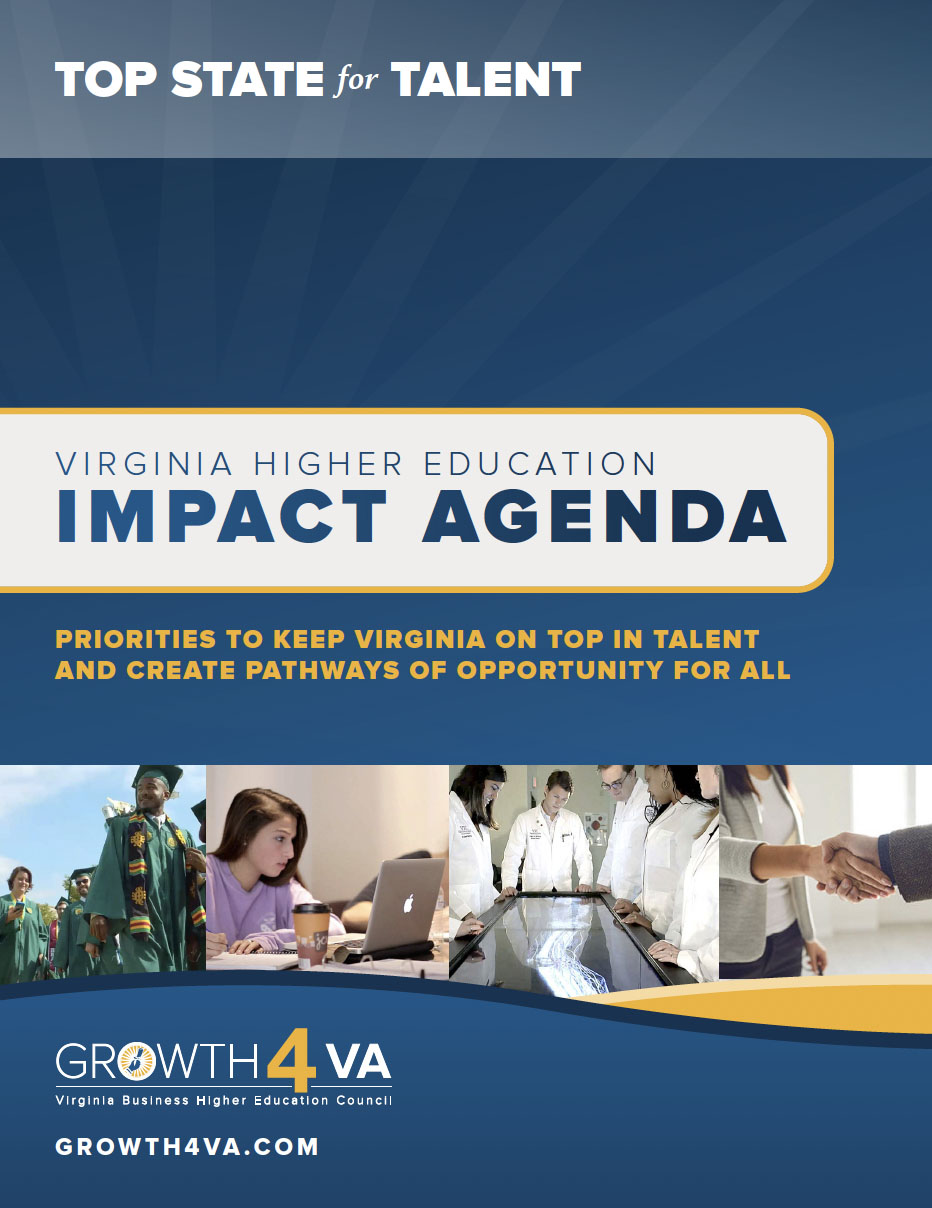Virginia Business Higher Education Council Spells Out Investment Priorities to Guide Budgeting as State’s Revenue Picture Tightens
Business-higher education partnership stresses internships and talent pathways, college affordability and ROI, research and regional economic development, problem-solving innovation, and community resilience
RICHMOND, VA (October 8, 2025) – With elected officials in both parties forecasting a tightening state budget situation in the months ahead, Virginia’s business-higher education partnership is urging incoming leaders to make talent investments a top priority and focus the resources where they will produce the greatest impact for the state and its residents. To help provide that focus, the Virginia Business Higher Education Council (VBHEC) today released its “Virginia Higher Education Impact Agenda” identifying four primary investment categories and 27 programmatic priorities.
Business leaders touted the recommended investments as the best way to secure Virginia’s status as the Top State for Talent, a distinction that drives the commonwealth’s competitive success in economic development, creates pathways to job and career opportunities for young Virginians, and produces ground-breaking innovations and transformational regional and local projects. Council members noted that Virginia’s higher education system currently enjoys top national rankings but neighboring state competitors are outpacing Virginia and investing thousands more per student in their colleges, universities, and community colleges.
The “Higher Education Impact Agenda” released today identifies investment priorities in four major categories:
- Talent Pathways and Internships – Providing all undergraduate students with paid internships that provide workplace experience and connect students to Virginia employers for full-time employment after graduation.
- Affordability and ROI – Improving affordable access to college so that every student has access to high-quality degree and credential programs that lead to in-demand jobs and strong returns on their educational investment.
- Innovation and Entrepreneurship – Supporting leading-edge research, converting discoveries into business start-ups, and investing in innovative projects with strong regional and local economic impact.
- Solving Problems and Strengthening Communities – Preparing the next generation of contributing citizens and problem-solving leaders who can bridge differences and make our communities, commonwealth, and country stronger.
The full Virginia Higher Education Impact Agenda can be found here.
Commenting on the investment priorities identified in the Impact Agenda, Dennis Treacy, chair of the Virginia Business Higher Education Council, said, “Leaders in both parties agree the state budget situation will be tightening in coming months. This will pose challenges, of course, but our business experience tells us it also will create an opportunity to focus resources where they have the greatest and most lasting impact. Our message is that, second only to the health and safety of our citizens, investing in talent development should be our commonwealth’s top priority. Everything from our state’s economic competitiveness to our young people’s job and career opportunities hinges on those investments.”
Other VBHEC Board Members also voiced their support for the priorities identified in the organization’s Impact Agenda.
“We are deeply grateful for the bipartisan state support that higher education has received in recent years,” commented Kirk Cox, president of the Virginia Business Higher Education Council. “We have the top-ranked higher education system in the country, and the state’s willingness to work in partnership with our higher education institutions has been essential to preserve quality and enhance affordability throughout the system. Looking forward, we can see that our competitors are not standing still, and neither can we. We need to invest where it will produce the highest return for our state and for individual Virginians.”
University of Mary Washington president Troy Paino, who also chairs the Council of Presidents for Virginia’s public higher education institutions, observed, “The college presidents and others who serve the students at our higher education institutions strongly share the priorities outlined today by our business leaders. One of the great strengths of our Virginia higher education system is that we have the nation’s most robust business-higher education partnership. When we come forward together with recommendations to achieve our commonwealth’s full talent development potential, everyone can be confident that educators and employers are going to work as true partners, creating affordable talent pathways that move students successfully from learning to earning.”
Christopher K. Peace, president of the Council of Independent Colleges in Virginia, stated, “Through Virginia’s public and nonprofit private colleges and universities, our higher education system offers students an unmatched variety of opportunities—preparing them for good jobs, equipping them with critical-thinking and problem-solving skills, and cultivating engaged citizens who strengthen our communities. Together, public and nonprofit private institutions are aligned around a focused strategy to ensure Virginia remains the Top State for Talent. With this roadmap in hand, our Commonwealth’s leaders can navigate budget challenges responsibly while keeping students—the future of Virginia’s workforce—at the forefront.”
VBHEC leaders will discuss the Higher Education Impact Agenda on Tuesday, October 14, at the Virginia Education and Workforce Conference at the Greater Richmond Convention Center. Both candidates for governor will address the conference to share their policies and plans related to higher education.
About the Virginia Business Higher Education Council:
VBHEC was founded in 1994 by Virginia business leaders on the principle that the prosperity of Virginia and the well-being of its citizens is fundamentally tied to access to a strong system of public colleges and universities.
A nonprofit, nonpartisan partnership between Virginia’s business community and higher ed leadership, VBHEC’s mission is to enhance the performance of Virginia’s public colleges, universities, and community colleges and their funding by state government so they can produce the greatest possible positive impact on Virginia’s economy.
VBHEC is committed to educating the public about higher education’s crucial role in Virginia’s economy, and it strives to secure the support needed for the Commonwealth’s colleges, universities, and community colleges to be affordable and accessible for all Virginians and rank among the nation’s best.
###

